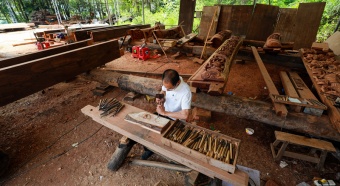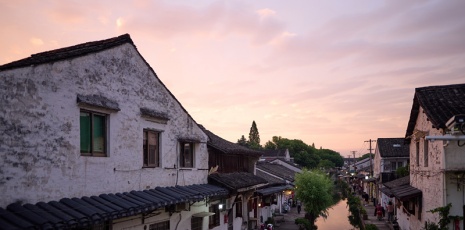Food is the paramount necessity of the people.
Born in a remote mountain village in southern Jiangxi in the late 1980s, I do feel a lot about this long-standing saying. I’ve heard many stories about “eating meat” from my grandparents since my childhood, among which some were actually sad black humors.
Before the reform and opening-up, some smart guys proposed various methods to improve their diet, of which the most common one was to cook together in the evening. Once, a villager caught dozens of loach in the ditch and invited his neighbors to eat together at night. Hearing the news, some villagers brought bowls of precious rice they had collected, and others picked up cabbages, garlics and onions from their fields. After casual washing, they put the food materials into a big pot, and ate in a crash when they smelled the meat flavor.
For grandparents’ generation, “eating meat” means eating well. At the threshold of the reform and opening-up policy of “granting the farmland to individual households”, it was not common for farmers to work outside or start their own businesses. Having no other reliable source of income, a family that could raise a few chickens and ducks would receive massive respects. The eggs were for supporting the whole family, and an unexpected fat pig was a plus for the family, paying for the children’s tuition fees, new clothes, and the debts. In the end, “eating meat” became a pipe dream.
In the 1980s and 1990s, villagers’ life style began to change gradually. Though the material was still insufficient, warmth and mutual understanding have kept people close. During busy farming days, relatives and friends always help each other, bringing their own food materials. Being half-loath and half-consenting, the host finally accepted it happily. When asking a bamboo cutter to cut down a few bamboos behind the house to make some useful objects, a bricklayer to repair the leaky roof or a plasterer to build a cowshed or a pigsty, the hospitable host would typically treat the craftsmen with good dishes such as a few pieces of preserved bacon that have been kept for half a year. Staring at the bacon greedily, they turned to pick up the side dishes. Until completion, under the host’s repeated request, the craftsmen could eat as fast as they wish and unravel their “selfish misconceptions” that have been wrapped up for several days at the last meal.
Reaching 30 years old, I recognized substantial changes happened in my beautiful hometown when I came back. The verdant mountains are attracting tourists from afar, who breathe the fresh air there as they like. The water is still clear, reflecting white walls and black tiles, rather than the traditional low earth houses. Meat has become commonplace for every household.
During the past 40 years of reform and opening-up, not to mention the front-runners, we ordinary people have profoundly experienced the great progress of our living standards, enjoyed the soaring sense of happiness brought about by material abundance, and turned the former hardship into beautiful memories, recalling the desire for meat, the fragrance of soy-sauced rice, and the crispness of fried pickles.









